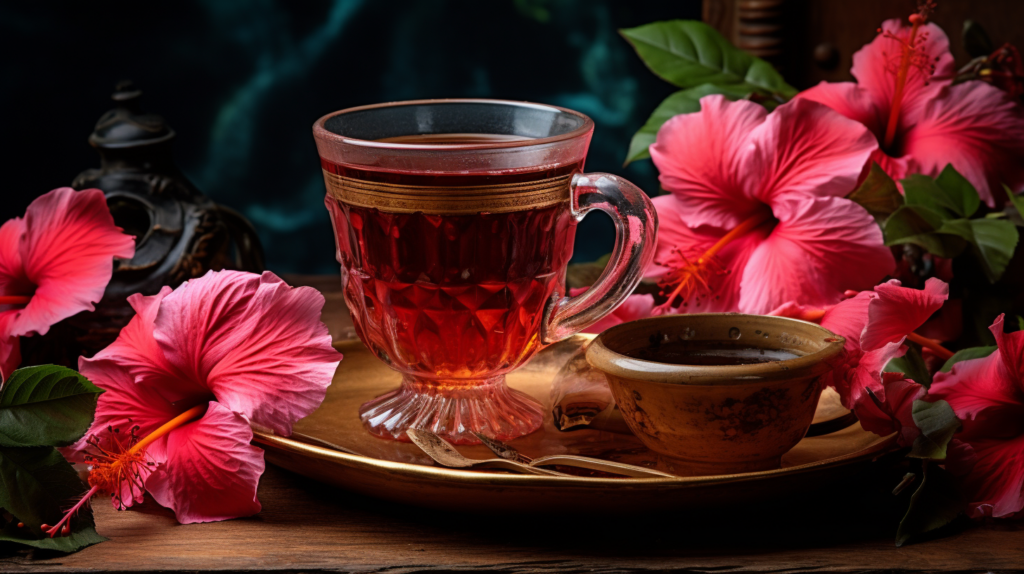Hibiscus tea is often touted for its potential health benefits, including weight management, but it’s important to understand that while it may be a helpful addition to your diet, it is not a miracle solution for weight loss. Here’s how hibiscus tea can potentially aid in weight management and some of its other benefits:
- Hibiscus Tea for Weight Management:
- Appetite Suppression: Hibiscus tea is known for its natural ability to help suppress appetite, which can be useful for controlling calorie intake. Drinking it before meals may help reduce the amount of food you consume.
- Diuretic Effect: Hibiscus tea can have a mild diuretic effect, which can lead to temporary weight loss due to the removal of excess water from the body. However, this is not the same as losing body fat.
- Metabolism Boost:
- Hibiscus tea contains antioxidants that may help improve metabolism. A healthy metabolism can aid in weight management.
- Blood Pressure Regulation:
- Hibiscus tea has been studied for its potential to lower blood pressure, which may be beneficial for individuals with hypertension or pre-hypertension. Maintaining a healthy blood pressure is important for overall health and can contribute to weight management.
- Antioxidant Properties:
- Hibiscus tea is rich in antioxidants, such as vitamin C and anthocyanins, which can help protect your cells from damage caused by free radicals. This may support overall health and well-being.
- Reducing Stress:
- Stress can contribute to weight gain. Hibiscus tea has a soothing effect and can help reduce stress and anxiety, potentially aiding in weight management by preventing emotional eating.
It’s important to note that while hibiscus tea has these potential benefits, it should be part of a comprehensive weight management plan that includes a balanced diet and regular exercise. Weight loss and maintenance are best achieved through a combination of a healthy lifestyle, calorie control, and physical activity.
Additionally, consult with a healthcare professional before making significant changes to your diet, especially if you have underlying health conditions or are taking medications, as hibiscus tea may interact with certain medications.

Here’s a simple recipe for making hibiscus tea:
Ingredients:
- 2 tablespoons dried hibiscus flowers (or a hibiscus tea bag)
- 2 cups of water
- Optional: sweetener of your choice (e.g., honey, sugar, or a sugar substitute)
Instructions:
- Boil the Water: Heat the 2 cups of water in a pot until it comes to a boil.
- Add Hibiscus Flowers: Once the water is boiling, remove it from the heat, and add the dried hibiscus flowers to the water. If you’re using a hibiscus tea bag, simply place the bag in the hot water.
- Steep: Cover the pot and let the hibiscus flowers steep in the hot water for about 5-10 minutes. This will allow the flavor and color to infuse into the water. You can adjust the steeping time to your taste; a longer steeping time will result in a stronger flavor.
- Strain: After steeping, strain the tea to remove the hibiscus flowers or tea bag. You can use a fine mesh strainer or a tea strainer.
- Sweeten (Optional): If you prefer your hibiscus tea sweet, you can add your choice of sweetener while the tea is still warm. Stir until it’s dissolved. The amount of sweetener is a matter of personal preference, so start with a little and add more to taste.
- Serve: Pour the hibiscus tea into cups or a pitcher with ice if you prefer it cold. You can also refrigerate it for a refreshing iced hibiscus tea. Garnish with a slice of lemon or a mint sprig if desired.
Enjoy your homemade hibiscus tea! It’s a refreshing and vibrant beverage that can be served hot or cold, and it’s also known for its potential health benefits.
